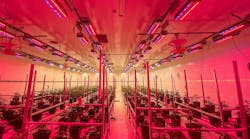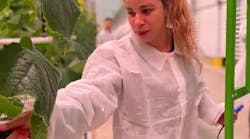PORTLAND, Ore. (Sept. 14, 2023) — Resource Innovation Institute (RII), a not-for-profit, public-private partnership advancing climate resilience, announced today the formation of the “CEA Footprint Project,” which will bring experts together from across the industry to establish agreed-upon methodologies that can guide environmental accounting and reporting related to controlled environment agriculture – as well as how CEA can be compared to traditional farming.
This industry-led initiative is being spearheaded by some of the biggest companies working across the globe in CEA today, including Bowery Farming, Little Leaf Farms, 80 Acres Farms, GrowUp Farms, Local Bounti, Vertical Harvest, Jones Food Co. and Ljusgårda. The group will meet through early 2024 to determine methodologies for measuring water and energy consumption, overall carbon footprint and other important environmental factors across greenhouse, indoor and field production methods. At the close of the project, the group will produce and release a guide on agricultural environmental accounting and reporting standards for farm operations and other stakeholders.
“We need to develop broadly accepted standards of measurement to understand the environmental benefits and impacts of today’s modern farm operations, with their evolving energy and water use profiles,” said Derek Smith, Executive Director of Resource Innovation Institute. “The CEA Footprint Project will not only help farm operations guide their climate-smart pathways, it will also provide a means for retailers and consumers to compare CEA and traditional farming practices to . Kudos to the farms who are leading this effort; they are truly making a difference.”
According to Smith, the initiative has three primary goals:
- Develop an international environmental accounting framework through consensus to enable complete, consistent, ongoing evaluation of modern farming methods
- Provide tools to enable producers and stakeholders to adopt standardized measurement
- Advance a broader understanding of the environmental benefits and impacts of CEA
A steering committee composed of industry and governmental organizations is leading the group’s efforts, with representatives from the U.S. Dept. of Energy, the International Fresh Produce Association, the CEA Alliance, FarmTech Society, World Wildlife Fund and the Swedish Environmental Research Institute.
About Resource Innovation Institute: We advance climate resilience through accelerating resource efficiency in controlled environment agriculture
Resource Innovation Institute (RII) is a not-for-profit, public-private partnership advancing climate resilience. RII provides resource efficiency education, training and data-driven verification, in collaboration with CEA producers, researchers, governments, utilities, and the design & construction sector. Visit our website at ResourceInnovation.org.





